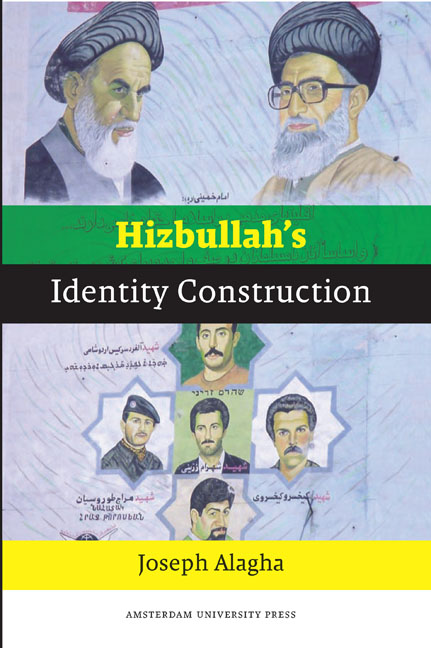Book contents
- Frontmatter
- Dedication
- Contents
- A Note on Transliteration
- Acknowledgements
- List of Abbreviations
- Summary
- Introduction and Analytical Framework
- 1 Tolerance and Discrimination: Ahl Al-Dhimma in the Islamic Order
- 2 Interpretation and Authority: Wilayat Al-Faqih
- 3 Political Violence: Terrorism and 9/11
- 4 Political Violence: Suicide Operations
- 5 From Cooptation to Contestation to Political Power
- 6 The Doha 2008 Accord and its Aftermath
- 7 The Eighth Conclave: A New Manifesto (November 2009)
- 8 Epilogue: Future Prospects – Disarmament and the Peace Process
- Afterword
- Glossary
- Additional Reading
- Notes
- Selected Bibliography
- Index
- Praise for Hizbullah's Identity Construction (1978-2010)
1 - Tolerance and Discrimination: Ahl Al-Dhimma in the Islamic Order
Published online by Cambridge University Press: 19 January 2021
- Frontmatter
- Dedication
- Contents
- A Note on Transliteration
- Acknowledgements
- List of Abbreviations
- Summary
- Introduction and Analytical Framework
- 1 Tolerance and Discrimination: Ahl Al-Dhimma in the Islamic Order
- 2 Interpretation and Authority: Wilayat Al-Faqih
- 3 Political Violence: Terrorism and 9/11
- 4 Political Violence: Suicide Operations
- 5 From Cooptation to Contestation to Political Power
- 6 The Doha 2008 Accord and its Aftermath
- 7 The Eighth Conclave: A New Manifesto (November 2009)
- 8 Epilogue: Future Prospects – Disarmament and the Peace Process
- Afterword
- Glossary
- Additional Reading
- Notes
- Selected Bibliography
- Index
- Praise for Hizbullah's Identity Construction (1978-2010)
Summary
INTRODUCTION
This chapter highlights the shift in Hizbullah's relationship with Lebanese Christians from regarding them as potential dhimmis within its conception of an Islamic state to citizens in a pluralistic polity. The author discusses in some detail, relying on primary sources and discourses, the place of Christians in Hizbullah's Islamic state, stressing points of agreement with and departure from the Prophetic tradition, and surveying how these influenced Hizbullah's policies in the 1980s. I will explain the seminal role of the 1990 Ta’if Agreement in helping to furnish these changes, in which the mixed confessional space led to the creation of pluralist politics and the emergence of a more or less ‘open’ public sphere. Hizbullah's second secretary-general laid the cornerstone of the party's transformation in his 1991 political program. Although Hizbullah's leaders and cadres paid lip service to an Islamic state, eventually Hizbullah dropped that notion from all its political programs by regarding it as a ‘legal abstraction’. Even its November 2009 Manifesto has no mention of the Islamic state. And so, Hizbullah engaged in dialogue with the Lebanese Christians on the basis of the Vatican's Papal Guidance, and included Christians and Sunnis in its legislative and municipal election slates. Through a series of interviews with the party's intellectuals and policymakers, I demonstrate that, starting in the 1990s, Hizbullah dropped the dhimmi categorization and replaced it with the concept of muwatana (citizenship).
HIZBULLAH'S RELATIONS WITH THE LEBANESE MYRIAD: THE CHRISTIANS AS A PROMINENT EXAMPLE
Although there has been dialogue between Hizbullah and the Sunnis, most notably through the prominent role of the Union of Muslim ‘Ulama, this was not the case with the Christians. From the early 1980s till 1990 hardly any political dialogue or high level contact was established between Hizbullah and Christians. Although on face value it appears that Hizbullah's call (da‘wa) in its Open Letter was addressed to all Christians, in reality Hizbullah shunned any contact with political Maronism, Maronites, and any collaborator with Israel. Though some Hizbullah cadres had some low-level contacts with Christians living in the party's constituencies – especially in the Biqa’ region, in the northeast of Lebanon and the Dahiya, Hizbullah's den in Beirut's southern suburb, which houses more than one million Shi‘ites – nonetheless no tangible high-level dialogue materialized between Hizbullah and the Christians.
- Type
- Chapter
- Information
- Hizbullah's Identity Construction , pp. 33 - 44Publisher: Amsterdam University PressPrint publication year: 2012

